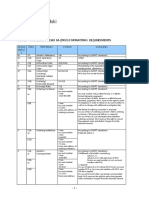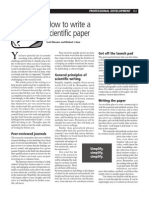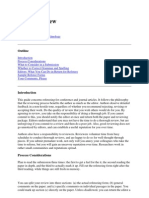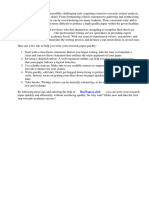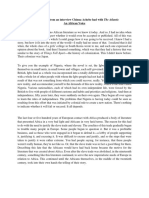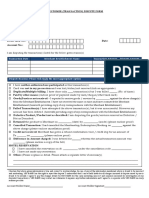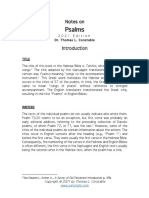Book Proposal Handout
Book Proposal Handout
Uploaded by
ErinJenneCopyright:
Available Formats
Book Proposal Handout
Book Proposal Handout
Uploaded by
ErinJenneCopyright
Available Formats
Share this document
Did you find this document useful?
Is this content inappropriate?
Copyright:
Available Formats
Book Proposal Handout
Book Proposal Handout
Uploaded by
ErinJenneCopyright:
Available Formats
Contact publishers
Examine recent lists of new titles, and check which publishers recur
frequently in your bibliography. Check out the book display at conferences.
Talk to editors, colleagues, advisers, about their experience (which may not
be relevantyou!ll need to discriminate". #f you think your work is a
plausible $t for list strengths of particular presses, send a description of your
book, a table of contents, a brief c.v., and information about length (a
wordcount", target audiences, and plans for illustrations.
%o the same with several plausible publishers. Each website will say
something about what the particular press wants. &ome refuse to accept
proposals by email. #f you!re in 'orth (merica, # want hardcopy) if you!re
elsewhere, #!ll accept a pro*ect description as an email attachment.
Submit a proposal
The description can be in a letter or as a more formal prospectus. Either
way, the editor wants a brief account of the argument and the
evidence+research on which it!s based. ,hat!s new and exciting here- ,hy
should we invest scarce capital in publishing it- ( letter or proposal provides
us something to evaluate. #t also gives you a chance to think about the
readerships for your work, to describe your manuscript!s strengths and
unique features, and to explain why we would be the right publisher. .ou may
$nd that the exercise of condensing your thoughts into proposal form is
helpful. The proposal does not need to be long / in a letter, a couple of
pages) in a more formal proposal, 012 pages. 3emember, the more
engagingly written the proposal, the more likely we are to engage with it.
,e do not expect that you will submit your proposal to only one press. (t
this stage you!re surveying the landscape, $nding out which of the publishers
in which you!re interested are actually interested in your work. Eventually
you!ll have to decide where to submit the complete manuscript for review.
4any presses won!t be willing to commission formal reviews in competition
with another publisher. 5ut that step comes later.
What to include in your proposal
(ddress your proposal to the correct editor at the 6ress.
%escribe your research in a page or two, eschewing academic *argon
and presenting the main thrust of your work clearly and simply.
%escribe any similar books. 7ow does yours stand apart- ,hat
conversations does your work engage-
4ention any books on our list that are complementary to yours.
#dentify your audiences. #f you imagine course use, list a few actual
courses at di8erent universities and their enrollment $gures where
possible. #f you think that the book is an important scholarly
monograph, explain its contribution. #f it!s 9general interest,: be
prepared to back up that claim.
#f the pro*ect started life as a dissertation, when did you defend and
who was on your committee- #mportant; what ma*or revisions have
you made or are you going to make-
<ive a word count for the current version of the manuscript and
indicate other apparatus; photos, tables, graphs, $gures, maps, etc. #f
the book includes illustrations, why are they necessary-
(re parts of the manuscript previously published- 'ote how much, and
what ma*or changes you intend to make. The more that has appeared
elsewhere, even in somewhat di8erent form, the less attractive the
book will be.
&ay when the manuscript will be ready for review. &et a realistic
deadline11there is no point in o8ering a tighter deadline than you can
handle.
#nclude an annotated table of contents.
#nclude a summary c.v.
%oes your college or university have a subvention program to support
scholarly publications by its faculty members- #f so, note the fact.
What happens next
.ou should expect a response in a few weeks) the shorter the description, the
quicker the response should be. %on!t be devastated by a 9no thanks: letter.
The editor may invite submission of the complete manuscript for formal
review) perhaps you!ll get a request for a sample chapter) have one ready to
send. '5 if the editor o8ers you a contract on the basis of the pro*ect
description, be very, very suspicious.
(ssume, if the editor o8ers formal review of the whole manuscript, that you
should '=T send the manuscript to another publisher. #f you want to do so,
askand don!t be surprised to be told no. The other side of this coin;
expect to be told (or ask" about the period of time you!ll be o8ering the
pro*ect on an exclusive basis.
(sk about how the particular press makes its decision whether to publish. #f
you don!t ask, you have no recourse when surprises happen. There will be
surprises. 'ot all will be pleasant.
#f you are o8ered a contract, congratulations> 5ut please read it carefully
before you sign it.
3oger 7aydon, Executive Editor
Cornell ?niversity 6ress
2@A East &tate &treet
#thaca, 'ew .ork @0B2C
DCE AEE AFFB ext AA2
rmh@@Gcornell.edu
You might also like
- Cover Letter For Elsevier Journal SampleDocument8 pagesCover Letter For Elsevier Journal Sampleafiwftfbu100% (2)
- Section 6 QuizDocument33 pagesSection 6 QuizImas Rohayati100% (2)
- Real Results That Enables Real Transformation: Custom Learning Solutions at The Centre For Executive EducationDocument12 pagesReal Results That Enables Real Transformation: Custom Learning Solutions at The Centre For Executive EducationArki100% (1)
- Mt103 - Pko Bank Polski Sa (Pko) Formatting Requirements: Status M/O/ C Field Field Name Content CommentsDocument3 pagesMt103 - Pko Bank Polski Sa (Pko) Formatting Requirements: Status M/O/ C Field Field Name Content CommentsSiau HuiNo ratings yet
- Cover Letter To Submit Research PaperDocument7 pagesCover Letter To Submit Research Paperjiyzzxplg100% (1)
- Scientific Journal Cover Letter SampleDocument5 pagesScientific Journal Cover Letter Sampleafmsfctasebwim100% (1)
- Research Paper On AuthorsDocument8 pagesResearch Paper On Authorsaflbojhoa100% (1)
- How To Revise Your Dissertation Into A BookDocument4 pagesHow To Revise Your Dissertation Into A BookFabricio Tocco ChiodiniNo ratings yet
- Research Paper Vs Book ReportDocument7 pagesResearch Paper Vs Book Reportguirkdvkg100% (1)
- How To Write Cover Letter For Scientific JournalDocument4 pagesHow To Write Cover Letter For Scientific Journalbcrqhr1n100% (2)
- Cover Letter Writing For Paper SubmissioDocument19 pagesCover Letter Writing For Paper SubmissioHaroon RashidNo ratings yet
- Thesis Literature Review TipsDocument7 pagesThesis Literature Review TipsJennifer Daniel100% (2)
- How To Write A Cover Letter For Article SubmissionDocument9 pagesHow To Write A Cover Letter For Article Submissionafllwqlpj100% (1)
- Dissertation Avenue ReviewsDocument4 pagesDissertation Avenue ReviewsCustomWrittenPaperSingapore100% (1)
- How To Write A Scientific Paper: Get Off The Launch PadDocument3 pagesHow To Write A Scientific Paper: Get Off The Launch PadRamchandra ChaudhariNo ratings yet
- Cover Letter For Journal SubmissionDocument7 pagesCover Letter For Journal Submissionktrplormd100% (1)
- Independent Study Unit (Final Evaluation) : Information and InstructionsDocument4 pagesIndependent Study Unit (Final Evaluation) : Information and InstructionsmichaelgrabhamNo ratings yet
- Information For Authors I 261108Document5 pagesInformation For Authors I 261108Eugen RadescuNo ratings yet
- Who To Write Research PaperDocument7 pagesWho To Write Research Paperojfhsiukg100% (1)
- Writing A Literature Review OutlineDocument4 pagesWriting A Literature Review Outlineea30d6xs100% (1)
- Cover Letter For Submitting Research PaperDocument7 pagesCover Letter For Submitting Research Paperskpcijbkf100% (1)
- Best Way To Conduct Literature ReviewDocument4 pagesBest Way To Conduct Literature Reviewafdtovmhb100% (1)
- How To Set Up A Research Paper OutlineDocument6 pagesHow To Set Up A Research Paper Outlinezyfofohab0p2100% (1)
- Turning Your Dissertation Into A Book ManuscriptDocument4 pagesTurning Your Dissertation Into A Book ManuscriptHelpInWritingPaperHartford100% (1)
- Example Conclusion On Research PaperDocument8 pagesExample Conclusion On Research Papertrsrpyznd100% (1)
- How To ReviewDocument12 pagesHow To Reviewmraziff2009No ratings yet
- A Guide To Revising The Dissertation Int PDFDocument12 pagesA Guide To Revising The Dissertation Int PDFNonameNo ratings yet
- Cover Letter Format For Journal SubmissionDocument8 pagesCover Letter Format For Journal Submissionf5dvx95v100% (2)
- Cover Letter For Paper Submission To JournalDocument7 pagesCover Letter For Paper Submission To Journalc2r4dwg3100% (1)
- Write Research Project Literature ReviewDocument5 pagesWrite Research Project Literature ReviewafmzweybsyajeqNo ratings yet
- Sample Conclusion For Research PaperDocument6 pagesSample Conclusion For Research Paperiyarmacnd100% (1)
- Steps in Writing A Review of Related LiteratureDocument8 pagesSteps in Writing A Review of Related Literatureafdtfhtut100% (1)
- How To Submit A ProposalDocument1 pageHow To Submit A ProposalJames SmithNo ratings yet
- Thesis Review of Literature SampleDocument7 pagesThesis Review of Literature SamplePurchaseCollegePapersOlathe100% (2)
- Career Research Paper Introduction ParagraphDocument7 pagesCareer Research Paper Introduction Paragraphgz8aqe8w100% (1)
- What Are Some Good Things To Write A Research Paper OnDocument6 pagesWhat Are Some Good Things To Write A Research Paper Onefhs1rd0No ratings yet
- Review of Related Literature Example ResearchDocument5 pagesReview of Related Literature Example Researchc5qvh6b4100% (1)
- Narrative Essay Which Explains The Process of Writing and Editing Your Research PaperDocument7 pagesNarrative Essay Which Explains The Process of Writing and Editing Your Research Paperh01xzacm100% (1)
- How To Review A Paper Seeking PublicationDocument2 pagesHow To Review A Paper Seeking PublicationFiona SinclairNo ratings yet
- 21W.777 The Science Essay: Mit OpencoursewareDocument3 pages21W.777 The Science Essay: Mit Opencoursewareanup chauhanNo ratings yet
- Literature Review Sample For DissertationDocument6 pagesLiterature Review Sample For DissertationPaperWriterLowell100% (1)
- Literature Review Guide UkDocument5 pagesLiterature Review Guide Ukafdtynfke100% (1)
- How To Type in A Inquire About PaperDocument3 pagesHow To Type in A Inquire About Paperprabhakaran_rjNo ratings yet
- 10 Steps in Writing A Research PaperDocument5 pages10 Steps in Writing A Research Paperefeh4a7z100% (1)
- What To Write in Literature Review of ThesisDocument7 pagesWhat To Write in Literature Review of Thesisnodahydomut2100% (1)
- Online Magazine Project Fall1Document3 pagesOnline Magazine Project Fall1Cøøl Heařtž KårthîNo ratings yet
- Writing Your First Research PaperDocument8 pagesWriting Your First Research Paperafnhbijlzdufjj100% (1)
- How To Write Literature Review in ThesisDocument8 pagesHow To Write Literature Review in Thesisn0nijitynum3100% (1)
- Tips On Writing A Research Paper QuicklyDocument4 pagesTips On Writing A Research Paper Quicklyafmctmvem100% (1)
- Step by Step Research Paper Writing GuideDocument5 pagesStep by Step Research Paper Writing Guideklbndecnd100% (1)
- How Many Chapters Should An 8000 Word Dissertation HaveDocument5 pagesHow Many Chapters Should An 8000 Word Dissertation HaveSomeToWriteMyPaperFayettevilleNo ratings yet
- Writing A Research Paper On An AuthorDocument6 pagesWriting A Research Paper On An Authorgz8xbnex100% (1)
- How To Start Off Your Research PaperDocument6 pagesHow To Start Off Your Research Papertitamyg1p1j2100% (1)
- Great Way To Start A Research PaperDocument5 pagesGreat Way To Start A Research Paperafedoahmf100% (1)
- Thesis Proposal Review of LiteratureDocument7 pagesThesis Proposal Review of Literaturec5praq5p100% (1)
- Writing Workshop Research PaperDocument7 pagesWriting Workshop Research Papervguneqrhf100% (1)
- Proposal Guidelines Monograph PDFDocument5 pagesProposal Guidelines Monograph PDFMaciej KassnerNo ratings yet
- Term Paper Bibliography SampleDocument7 pagesTerm Paper Bibliography Sampleaflstjdhs100% (1)
- Guidelines For Writing Conference Paper ProposalDocument4 pagesGuidelines For Writing Conference Paper ProposalTanviSheikhNo ratings yet
- Sample Cover Letter Thesis SubmissionDocument7 pagesSample Cover Letter Thesis Submissionjedod0nelit3100% (2)
- AISC Proceedings Proposal Form: Book FormatDocument4 pagesAISC Proceedings Proposal Form: Book Formatabdul.azeezNo ratings yet
- How To Write A Good Introduction For A Literature ReviewDocument6 pagesHow To Write A Good Introduction For A Literature Reviewhozul1vohih3No ratings yet
- Claudio Vita-Finzi-A History of The Solar SystemDocument110 pagesClaudio Vita-Finzi-A History of The Solar SystemAnonymous 0LxzQQgRNo ratings yet
- Apple StoresDocument3 pagesApple StoresAnjana SharmaNo ratings yet
- Government Polytechnic Muzaffarpur: Name of The Lab: Power Electronics & DrivesDocument18 pagesGovernment Polytechnic Muzaffarpur: Name of The Lab: Power Electronics & Drivesshashi kumarNo ratings yet
- CH15Document29 pagesCH15Hamza AlBulushiNo ratings yet
- Litary, Biographical, Linguistic and Socio-Cultural Context of Literary TextDocument17 pagesLitary, Biographical, Linguistic and Socio-Cultural Context of Literary TextAbegael PrimaNo ratings yet
- English NSC FAL P2 QP Sept 2022 GautengDocument28 pagesEnglish NSC FAL P2 QP Sept 2022 Gautengkwetsimohope05No ratings yet
- Topic DDocument17 pagesTopic Dajay dalaiNo ratings yet
- An African Voice - Assgined ReadingDocument1 pageAn African Voice - Assgined ReadingChiranjib ParialNo ratings yet
- Research Method A. Place and Time of ResearchDocument8 pagesResearch Method A. Place and Time of ResearchRhufu Rhumun FujiNo ratings yet
- Customer (Transaction) Dispute Form To, Yes Bank LTD Card Operations One Indiabulls Park, Yes Bank Towers, 3 Floor, Plot No. 14, 3Rd Main Road, Ambattur Industrial Estate, CHENNAI - 600058Document1 pageCustomer (Transaction) Dispute Form To, Yes Bank LTD Card Operations One Indiabulls Park, Yes Bank Towers, 3 Floor, Plot No. 14, 3Rd Main Road, Ambattur Industrial Estate, CHENNAI - 600058RavikiranNo ratings yet
- 17-Article Text-37-2-10-20200615.id - enDocument4 pages17-Article Text-37-2-10-20200615.id - enIskandar PakayaNo ratings yet
- Ux Foundation Specimen PaperDocument13 pagesUx Foundation Specimen PaperalissmayoloweNo ratings yet
- Penerapan Personal Hygiene Karyawan Housekeeping Department Hotel Tjokro Pekanbaru Oleh: Alamsyah Pembimbing: Rd. Siti Sofro SidiqDocument15 pagesPenerapan Personal Hygiene Karyawan Housekeeping Department Hotel Tjokro Pekanbaru Oleh: Alamsyah Pembimbing: Rd. Siti Sofro SidiqKevin KurniawanNo ratings yet
- Etec 6223 Educational ReportDocument13 pagesEtec 6223 Educational Reportapi-310826346No ratings yet
- 8 0 Docs PDFDocument2 pages8 0 Docs PDFczarjeff3497No ratings yet
- Chapter 9 - Error Worksheet - VIIDocument5 pagesChapter 9 - Error Worksheet - VIIaarushi guptaNo ratings yet
- Ebsd (Electron Backscattered Diffraction)Document45 pagesEbsd (Electron Backscattered Diffraction)mm11_nedNo ratings yet
- ChainlessSlaves PDFDocument218 pagesChainlessSlaves PDFtraumabasedmind100% (2)
- Fch14 04 Leader Guide Spicesof IndiaDocument14 pagesFch14 04 Leader Guide Spicesof IndiaHem Chandra PantNo ratings yet
- Fundus Examination PDFDocument125 pagesFundus Examination PDFAravind Kumar100% (5)
- PsalmsDocument522 pagesPsalmsJaphet Rosero100% (1)
- Course Code: Ge 9: Name: Von Ryan B. Jimenez Section: EDocument7 pagesCourse Code: Ge 9: Name: Von Ryan B. Jimenez Section: ECristelle Estrada-Romuar JurolanNo ratings yet
- 13-Angle PropertiesDocument13 pages13-Angle PropertiesSameh SalahNo ratings yet
- Transient Response of RLC CircuitDocument10 pagesTransient Response of RLC CircuitDr. Omar Sh. AlyozbakyNo ratings yet
- Rebekah Chesney Rich TaskDocument27 pagesRebekah Chesney Rich Taskapi-605614266No ratings yet
- Pediatric and Adolescent GynecologyDocument11 pagesPediatric and Adolescent GynecologyAndrea GuidoteNo ratings yet
- Conceptual Framework Thesis PDFDocument4 pagesConceptual Framework Thesis PDFNeedSomeoneToWriteMyPaperForMeUK100% (1)



